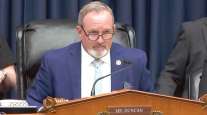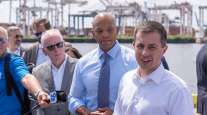Staff Reporter
Cities Find Easier Access to Infrastructure Funds

[Stay on top of transportation news: Get TTNews in your inbox.]
While local communities have more access to federal infrastructure funds to improve transportation, rising project costs are creating difficulties.
Leaders from four prominent organizations representing cities, counties and state legislatures gathered at a National League of Cities virtual briefing for news reporters May 16 — the start of Infrastructure Week (May 16-20) — and also marked passage of President Joe Biden’s $1.2 trillion Infrastructure Investment and Jobs Act, also called the bipartisan infrastructure law.
“Six months ago we were in the White House as the president signed the bipartisan infrastructure law into law,” said Vince Williams, mayor of Union City, Ga., and NLC president. “And today, America’s cities, states and counties are applying and planning for these historic funds to come to their communities.”
.@ucmayorvince spoke at @BPC_Bipartisan about how the Bipartisan Infrastructure Law can help communities like Union City, GA become more resilient in the face of disaster. #BPCLive #LeadWithInfrastructure pic.twitter.com/bAOc7PvUN0 — National League of Cities (@leagueofcities) May 16, 2022
Larry Johnson, president of the National Association of Counties and commissioner for DeKalb County, Ga., said NACo is providing much-needed assistance to small rural communities to help them get federal infrastructure funds to improve transportation.
Johnson cited a small Oklahoma community with “more bridges than people” that lacks sophisticated grant writers, but “they have to be able to fill that paperwork out because their infrastructure has been crumbling for years.”
LaToya Cantrell, mayor of New Orleans, said the federal government is listening to local government leaders about the need to cut through red tape to access infrastructure funds. She serves in the United States Conference of Mayors as co-chair of its infrastructure law implementation task force.
Recently, 21 representatives from the Biden administration visited New Orleans to hear what is working and learn about problem areas for improvements.
Cantrell said the city applied for one of the first BIL opportunities when it met an April 24 deadline to submit a proposal for a U.S. Department of Transportation discretionary grant in the Rebuilding American Infrastructure with Sustainability and Equity program. She described a “seamless process” in the grant application. DOT has been working to make grant applications less burdensome for municipalities.
“The level of communication and coordination provided by the federal government was priceless,” she added.
Despite an easier process, Cantrell said New Orleans is dealing with rising project costs. “The trifecta is real,” she declared, noting the combined impact of inflation, supply chain issues and a lack of workers is negatively impacting infrastructure projects.
Prices jumped 21% for materials and services on new nonresidential construction in April compared to a year earlier, according to the Associated General Contractors of America.
Ken Simonson, its chief economist, commented in a May 12 report, “Nonresidential contractors have endured 12 months of 20% increases in the cost of items they need to build projects. While they have been able to pass some of those increased costs on to clients, most of those increases have come out of their own bottom line.”
Project planners across the country, including New Orleans, are feeling the pinch.
Cantrell described the situation as an existing condition “we’re going to have to work through.” She said New Orleans is experiencing difficulties with its requests for proposals that are being issued.
“We may get no bidders, or we get one bidder, or we find the cost of the project based on the bid has escalated, has increased double in some instances. It is having a tremendous impact locally to where we’re having to take another look at projects, look at the design, look at how we may be able to leverage additional resources to move that project forward,” Cantrell said.
Want more news? Listen to today's daily briefing above or go here for more info
Also speaking at the NLC event was Scott Saiki, Hawaii speaker for the House of Representatives and president of the National Conference of State Legislatures. He noted that state lawmakers are grateful for the federal investments to improve funding for roads, highways and bridges.
He also highlighted the importance of providing more broadband access, which is another emphasis area for federal infrastructure funds.
Saiki remarked that undersea cables across the Pacific Ocean that connect the islands to the mainland and foreign countries via the internet are “of vital importance not just to our state, but to national security interests.”




